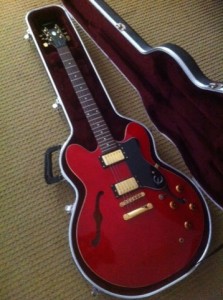The Guitar Chronicles: A Practical Guide For Beginners Who Want To Become Masters of Their Craft
 Are you considering learning to play the guitar. Music is a universal thing that can bring people together and put a smile on people’s faces, but learning to play an instrument can be downright daunting. If you’re a new player, keep reading to discover just a few guitar tips for beginners that can be of great help to you as you begin your journey toward musical greatness.
Are you considering learning to play the guitar. Music is a universal thing that can bring people together and put a smile on people’s faces, but learning to play an instrument can be downright daunting. If you’re a new player, keep reading to discover just a few guitar tips for beginners that can be of great help to you as you begin your journey toward musical greatness.
Choosing A Guitar
When it comes to choosing a guitar, players have two choices: acoustic or electric. While there are benefits to choosing both, it may be beneficial for beginners to start with an acoustic guitar for the following reasons:
No additional equipment (such as an amplifier) is required in order to play the acoustic guitar.
Acoustic guitars are highly portable, which means you can squeeze in a quick practice session virtually anywhere.
Acoustic guitars often have heavier strings, and this helps beginners develop the hand and finger strength they need to play well.
Acoustic guitars are generally cheaper, which makes it easier for budding artists to buy their own instrument.
Once you’ve decided which type of guitar you want, your next step should be visiting a guitar shop to purchase one of your very own. While a sales associate can give you a few guitar tips to help you make your choice, you need to make sure you choose a guitar that will work best with your body and the way you play. Try out different options and select one based on how it feels when you play it. Make sure the overall size and weight are appropriate for your body and that the neck size is proportionate to your hand size.
Playing Your Guitar
You may be a little uncertain about your skills, but there are a few guitar tips that can make things a little easier for those who are just starting out:
Tip #1: Play slowly and deliberately.
Beginners are often in a hurry to learn how to play their favorite songs so that they can impress their friends and family members. However, this way of learning and playing won’t develop good guitar players. Instead, spend a little time with each and every passage, making sure that you can play each one perfectly at a slow speed. Once you have mastered that passage, you can then move on to playing it at the normal tempo.
Tip #2: Use a metronome to help you keep time.
Time is an essential component of music. In order to play well, you must be able to catch the rhythm of a song and play on beat. One of the best tips for learning guitar is to begin using metronome to help you stay on track with your time. With consistent use, you’ll be able to figure out why and where you may be getting off track so that you can correct the issue.
Tip #3: Get your finger positioning right in order to play chords well.
If you’re not getting clarity in your sound when you play a chord, it may be because your fretting hand needs better positioning. To start, make sure that the finger playing the chord stays squared instead of falling flat so that it does not mute your string. Also, check to make sure that you aren’t placing your finger too far from the fret and that you are placing the right amount of pressure on the strings. Getting these things right will help put you on the fast track to better playing.
Tip #4: Train your ear by playing songs without the sheet music or tablature.
It’s important for all musicians to be able to read music, but it’s equally as important that you can recognize melodies, intervals, chords, and other aspects of the music by ear. This will help you become a better player and more easily recognize the areas in which you need to improve. If you ever intend to form or join a band, developing your listening skills will also help you learn to play well with others.
Education & Practice Time
As you continue to learn how to play your guitar, your dedication to consistent practice and learning is what will ensure that you keep getting better. In order to make that happen, make sure that you always keep the following core principles in mind:
Learn music theory so that you have a better understanding of the mechanics of music and songwriting, but make time for practical learning as well.
Keep things fun and exciting by learning how to play your favorite songs and making time to create your own. It’s vital that you practice mechanics, but don’t get so caught up in doing so that you neglect what you really love.
Make sure that you’re always listening. In order to get better, you need to take time to listen to other people play as well as listening to recordings of your own playing.
Purchase books and courses that will give you clear steps to learning guitar. Nothing beats the power of educating yourself about your craft.
There’s a lot for a musician to think about when they’re just starting out. However, with the right tools and the right guitar playing tips, learning to play the guitar can quickly go from being something that intimidates you to being something that brings you boundless enjoyment for many years to come.







